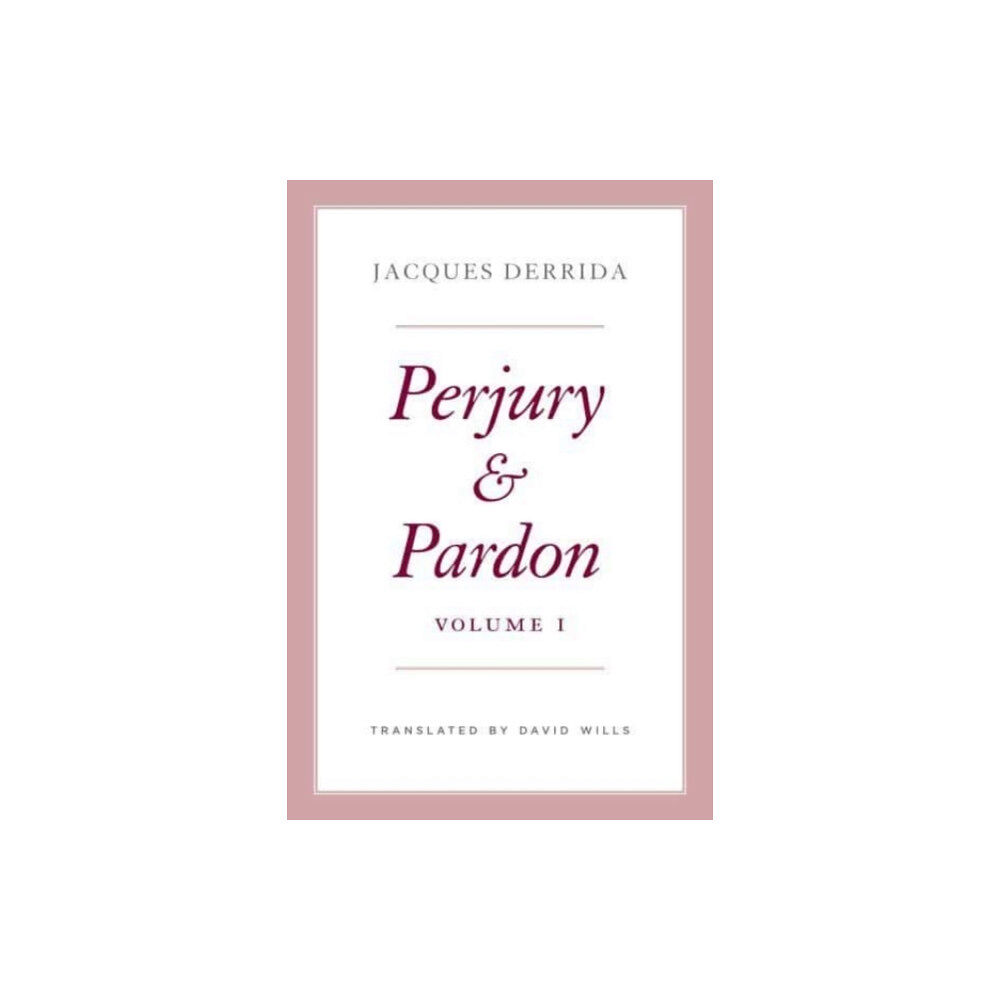- Hem
- Böcker
- Kurslitteratur
- Filosofi, Religion & Etik
- Perjury and Pardon, Volume I (inbunden, eng)

Perjury and Pardon, Volume I (inbunden, eng)
An inquiry into the problematic of perjury, or lying, and forgiveness from one of the most influential philosophers of the twentieth century...
515 kr
549 kr
Bara 2 kvar
Skickas inom 4 - 5 vardagar
- Fri frakt
Just nu: Fri frakt på alla köp
Snabb leverans
Alltid låga priser
Produktbeskrivning
An inquiry into the problematic of perjury, or lying, and forgiveness from one of the most influential philosophers of the twentieth century. “One only ever asks forgiveness for what is unforgivable.” From this contradiction begins Perjury and Pardon, a two-year series of seminars given by Jacques Derrida at the École des hautes études en sciences sociales in Paris in the late 1990s.
In these sessions, Derrida focuses on the philosophical, ethical, juridical, and political stakes of the concept of responsibility. His primary goal is to develop what he calls a “problematic of lying” by studying diverse forms of betrayal: infidelity, denial, false testimony, perjury, unkept promises, desecration, sacrilege, and blasphemy.
Although forgiveness is a notion inherited from multiple traditions, the process of forgiveness eludes those traditions, disturbing the categories of knowledge, sense, history, and law that attempt to circumscribe it. Derrida insists on the unconditionality of forgiveness and shows how its complex temporality destabilizes all ideas of presence and even of subjecthood.
For Derrida, forgiveness cannot be reduced to repentance, punishment, retribution, or salvation, and it is inseparable from, and haunted by, the notion of perjury. Through close readings of Kant, Kierkegaard, Shakespeare, Plato, Jankélévitch, Baudelaire, and Kafka, as well as biblical texts, Derrida explores diverse notions of the “evil” or malignancy of lying while developing a complex account of forgiveness across different traditions
In these sessions, Derrida focuses on the philosophical, ethical, juridical, and political stakes of the concept of responsibility. His primary goal is to develop what he calls a “problematic of lying” by studying diverse forms of betrayal: infidelity, denial, false testimony, perjury, unkept promises, desecration, sacrilege, and blasphemy.
Although forgiveness is a notion inherited from multiple traditions, the process of forgiveness eludes those traditions, disturbing the categories of knowledge, sense, history, and law that attempt to circumscribe it. Derrida insists on the unconditionality of forgiveness and shows how its complex temporality destabilizes all ideas of presence and even of subjecthood.
For Derrida, forgiveness cannot be reduced to repentance, punishment, retribution, or salvation, and it is inseparable from, and haunted by, the notion of perjury. Through close readings of Kant, Kierkegaard, Shakespeare, Plato, Jankélévitch, Baudelaire, and Kafka, as well as biblical texts, Derrida explores diverse notions of the “evil” or malignancy of lying while developing a complex account of forgiveness across different traditions
| Format | Inbunden |
| Omfång | 368 sidor |
| Språk | Engelska |
| Förlag | The University of Chicago Press |
| Utgivningsdatum | 2022-09-27 |
| ISBN | 9780226819174 |
Specifikation
Böcker
- Format Inbunden
- Antal sidor 368
- Språk Engelska
- Utgivningsdatum 2022-09-27
- ISBN 9780226819174
- Förlag The University of Chicago Press
Leverans
Vi erbjuder flera smidiga leveransalternativ beroende på ditt postnummer, såsom Budbee Box, Early Bird, Instabox och DB Schenker. Vid köp över 399 kr är leveransen kostnadsfri, annars tillkommer en fraktavgift från 39 kr. Välj det alternativ som passar dig bäst för en bekväm leverans.
Betalning
Du kan betala tryggt och enkelt via Avarda med flera alternativ: Swish för snabb betalning, kortbetalning med VISA eller MasterCard, faktura med 30 dagars betalningstid, eller konto för flexibel delbetalning.
Specifikation
Böcker
- Format Inbunden
- Antal sidor 368
- Språk Engelska
- Utgivningsdatum 2022-09-27
- ISBN 9780226819174
- Förlag The University of Chicago Press
